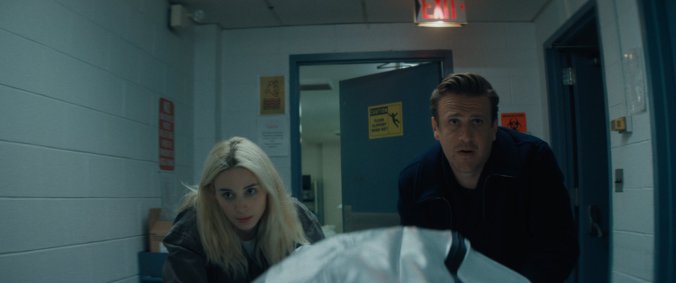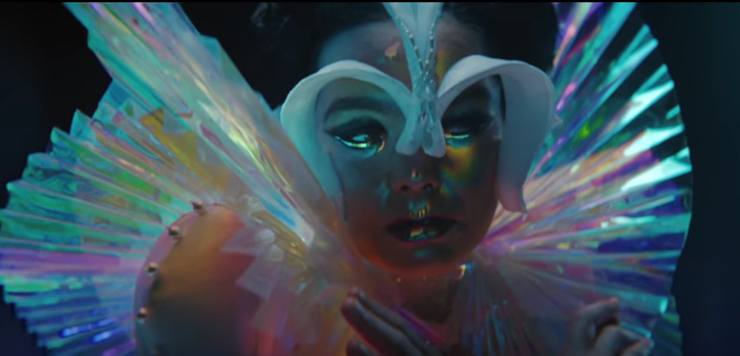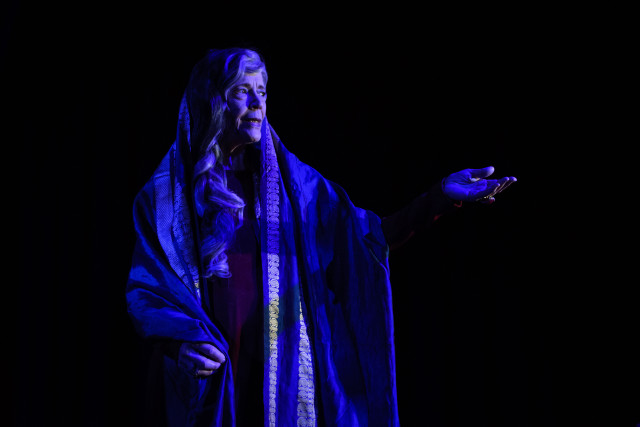
Rooney Mara and Jason Segel in a scene from Charlie McDowell’s The Discovery.
 “It feels as if we have been handed a sweeping novel, but told only to read a few dull chapters in the middle.”
“It feels as if we have been handed a sweeping novel, but told only to read a few dull chapters in the middle.”
by Ken Bakely
Low, grey clouds hang over the sky. The ground seems cold and damp. Indoor lighting is harsh and fluorescent or simply nonexistent. Charlie McDowell’s The Discovery is a movie which wants you to know how muted its world is. It’s the kind of film which swirls about in its own universe and tells you about its characters, but never actually accomplishes anything of interest. The entire script feels like a boring TV pilot stretched out to 102 minutes. We join the action after the titular discovery and skip over all the interesting parts. The primary function of storytelling – show, don’t tell – is neglected in favor of dull exposition.
Two years ago, a scientist named Thomas Harbor (Robert Redford), made a monumental announcement: he had found proof of an afterlife, based on conclusive evidence of post-mortem brain activity. Termed “the discovery,” this event revolutionized the world, but at a tremendous cost – since this declaration was made, over four million people around the world have committed suicide, many for no other reason than curiosity about what this afterlife might entail.
Consequently, Harbor has gone off the grid, relocating to an old estate on an isolated island accessible only by ferry, continuing his research in a private manner but also attempting to give back. He has started a halfway home of sorts, where despondent individuals who attempted to kill themselves are given work and community, overseen by the doctor himself. His son Will (Jason Segel) has come to visit. He holds vague resentment toward his father’s claims, but uses this opportunity to reform their relationship. However, on his way there, Will encounters a woman named Isla (Rooney Mara). She attempts to drown herself, but he encounters this and saves her life, and she is inducted into the institution. There, she and Will grow close, and also discover the mysteries which still surround the discovery and its continued effects on humanity as a whole.
One may think that it seems impossible for a movie about finding proof of an afterlife to be boring. This is probably true. The fact of the matter is that The Discovery isn’t about that at all. It’s not even about the aftermath of those revelations. The film, for the most part, is hardly about anything. It is a character piece in the most glued-up sense of the term, as Will and Isla take an astonishingly long amount of time to uncover information about what the “afterlife” is. In moments like these, it feels as if we have been handed a sweeping novel, but told only to read a few dull chapters in the middle. McDowell relinquishes any remaining tensions with an ending that suggests a far more interesting story, only to be cut off by credits.
As a result, it’s difficult for any particular performances to thrive in the film. Redford’s character, who has suffered great personal and professional tragedies as a direct consequence of his actions, is closed-off, underwritten, and often used as a vehicle to move the story from scene to scene. It is suggested by Will early on that he worries his father, in his current position as the leader of the estate, is slowly transforming into a cult leader. There is no further investigation of this principle beyond a few late-stage events which are used as shoddy transitional pieces. Speaking of Will, he’s a blank slate as well, with Segel unable to imbue any real characteristics into him beyond confusion and frustration. Rooney Mara faces similar troubles with Isla, as the screenplay uses her character’s mysterious background as an enticing feature and then dumps all the answers out in the least elegant of ways.
It’s strange that McDowell seems to have faced so much trouble in crafting a story here. His first film, The One I Love, also featured a high-concept plot with a low-key setting, but was able to navigate its complexities in more reasonable, appropriately framed ways. The script ran into a bit of trouble with its own explanatory track, but it was by no means a dealbreaker. Knowing our director’s prior abilities as a filmmaker is part of what makes The Discovery so disappointing the longer one reflects upon it. In the space between life and death, this world and the next, the movie fumbles, and never provides any meaningful observations of either one.
Advertisements Rate this:Share this:




